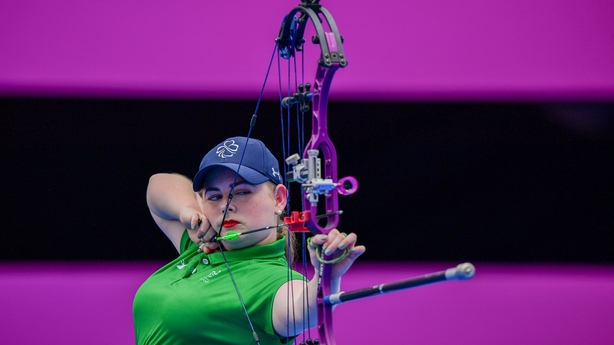Archer Kerrie Leonard will be among the first Irish athletes to compete at the 2024 Paralympic Games.
Para archery, which takes place at Esplanade des Invalides, is one of the front-loaded events in Paris, with the action getting underway at 12pm Irish time on day one.
The sport is rooted in the fabric of the Paralympic movement, first used as a rehabilitation activity for injured veterans at Stoke Mandeville Hospital by Dr Ludwig Guttmann.
The Stoke Mandeville Games was the forerunner to the Paralympics, and when the first Games took place in 1960, it was one of the eight sports in the inaugural event.
On Thursday, the wheelchair user will take her place among 27 other competitors in the W2 compound event. The initial ranking round will see archers shoot 72 arrows over distances of 50m or 70m.
If she makes the top 16, Leonard will return the following morning, while day three will see the top-eight battle it out for medals.
Eyes on the prize! 🎯
— Paralympics Ireland (@ParalympicsIRE) August 23, 2024
Our archer Kerrie Leonard getting some practice rounds in at the iconic Para archery venue for the Paralympic Games - Esplanade des Invalides. (1/3) pic.twitter.com/HA0EkvUdgB
By her own admission, the journey to Paris hasn't been seamless.
"This entire cycle has been particularly difficult," the 34-year-old tells RTÉ Sport. "It’s been a hard slog, working full-time. I have been in the mindset for Paris for quite some time, so I’m very excited."
Leonard left full-time employment earlier this year to throw her lot into Paris and, having become a Paralympian in Tokyo, she is acutely aware of rising standards in the sport.
She finished ninth three years ago.
"I came away from Tokyo with a lot of decisions to make," she says. "I was trying to justify whether I could stay in the sport or not. The athletes are making it their full-time careers. It is in everything but name a professional sport.
"I really was concerned whether I, as an amateur athlete, would be able to stay with the pack. The standard has shot up immensely. You can see the consistency in all my competitors. It’s extremely impressive to watch."

Living on a farm allows Leonard the space she needs to train at home. The tarmacked driveway is measured out to competition standards and it’s easy to collect her arrows. If not a little unusual looking to an outsider.
"The postman does look at me twice as I shoot up the driveway, it’s a little jarring," she says.
It is for the most part a solitary regime, so leaning into sports psychology is crucial to maintaining focus. Strength training is another vital component of her preparation.
"Archery is a monotonous sport, anything that changes up the routine and pattern to keep you on track is really important," she says.
"What a lot of people don’t understand is that a cycle is four years. The initial two years, it’s really on you to be motivated and committed to the sport.
"The pressure and adrenaline side of things kicks in when you go to qualifying competitions, but that is in the latter half for the cycle. If you are not fit in the first two years of that cycle, in the best position you can be in, you are doing yourself a disservice."
Leonard first competed for Ireland in 2012, and after a short break returned, narrowly missing out on Rio despite a silver medal at the 2016 European Championships.
She has witnessed the journey para sport has gone on in terms of exposure. The athletes are getting more exposure – RTÉ will show more Paralymic coverage than ever before – and on the back of a successful Olympic Games in Paris, more than 1.75m tickets have been sold for the Paralympics.
Acknowledging things are improving, Leonard still feels there is a distance to travel in terms of public recognition
"What I think needs to now shift is public perception," she says. "People are very comfortable calling me an Olympian.
"I’m okay – just about – with them referring to me as that. We need the public to understand what a Paralympian is doing is the exact same standard as an Olympian.
"I thought there would be a much sharper increase after the London Games; it plateaued after 2012.
"The sport has shifted, the standard has shot up, so we need to recognise that as a society."
The 2024 Paralympic Games takes place from 28 August - 8 September. Follow all the action from Paris with our coverage on RTÉ.ie/sport and the RTÉ News app, watch live on RTÉ2 and the RTÉ Player or listen to updates and live commentaries on RTÉ Radio.



